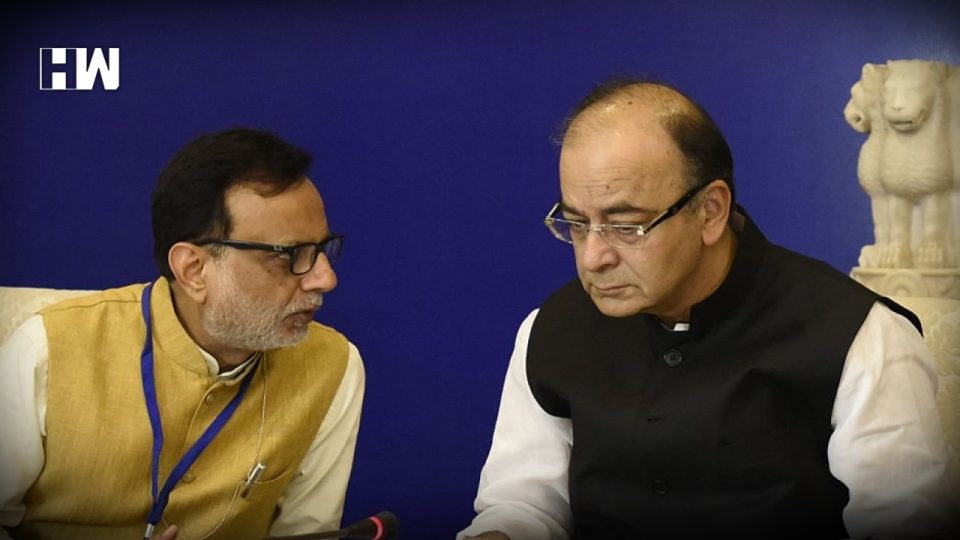The then Revenue Secretary Hasmukh Adhia dismissed the RBI’s concerns. In a note, he wrote that the RBI didn’t understand the proposed mechanism of Electoral Bonds.
New Delhi| The Narendra Modi government overlooked the red flags raised by the Reserve Bank of India- the apex banking institution of the country over the electoral bond scheme. According to a report published in Huffpost India, written by Journalist Nitin Sethi, before the then Finance Minister Arun Jaitley introduced the Electoral Bond scheme during the Union Budget presentation in 2017, the RBI has warned the government against the move.
Since its introduction two years ago, the electoral bonds have been a matter of concern with transparency activists raising concern that the system makes political funding more opaque. As per the scheme, the political parties can receive anonymous donors and not reveal their names. This had stoked the fear of corporate and foreign funding without clarity.
Finance Ministry seeks RBI’s “Early Comments” on Electoral Bonds
According to the report, four days before the 2017 Budget presentation, a tax official in the Finance Ministry was going through the documents. This was when he realized that the new scheme would need an amendment to the Reserve Bank of India Act. “Legalising these anonymous donations would need amendments to the Reserve Bank of India Act, the tax official wrote in a note dated January 28, 2017, to his superiors in the finance ministry,” Nitin Sethi reports.
Also Read: Centre defends electoral bonds in Supreme Court; says reforms aim to defeat black money
The official even wrote the amendments and sent it to his seniors for the approval of Finance Minister. On the very same day, an official in the finance ministry wrote an E-mail to the then deputy governor of RBI Rama Subramaniam Gandhi at 1:45 pm. The short E-mail sought RBI’s “early comments” on the proposed amendment. Urjit Patel was the governor of RBI at that time.
RBI’s Opposition
Within two days, by January 30, RBI replied with its unanimous opposition to the move. “The RBI said that electoral bonds and the amendment to the RBI Act would set a “bad precedent” by encouraging money laundering and undermining faith in Indian banknotes, and would erode a core principle of central banking legislation,” Sethi wrote.
The RBI apparently also highlighted that Electoral Bond would encourage a type of “Bearer Bond”-which carries no trace of ownership and is transferrable. The RBI in its reply said that such Bearer instruments have the potential to become the currency and if issued in sizeable quantities can undermine faith in banknotes issued by RBI. It added, “The bonds are bearer bonds and are transferable by delivery. Hence who finally and actually contributes the bond to the political party will not be known.”
Finance Ministry overlooks RBI’s opposition
However, the then Revenue Secretary Hasmukh Adhia dismissed the concerns raised by the RBI. In a note written to Economic Affairs Secretary Tapan Ray and FM Arun Jaitley, he wrote that the RBI has not understood the proposed mechanism of Electoral Bonds “for the purpose of keeping the identity of the donor secret while ensuring the donation is made only out of fully tax paid money of a person”.
He further seemed to have ignored the RBI suggestions implying that it was late. Adhia wrote that the RBI’s advice has come quite late and the Finance Bill is already printed. “We may, therefore, go ahead with our proposal,” he added. This reply came despite The RBI responding on the first working day after it was asked for comment, Sethi wrote.
His colleague Tapan Ray too agreed with Adhia’s remarks. The file moved with “lightning speed” and was signed by Arun Jaitley. Subsequently, Arun Jaitley in the capacity of the Finance Minister presented the 2017 budget.
Not only RBI, Govt disregarded ECI and Opposition party suggestions
However, according to the report, the govt not only overlooked the RBI opposition to electoral bonds but also “misled” the Election Commission of India. The report also alleges that the Modi govt lied to the parliament.
“Three senior bureaucrats came up with six different convoluted explanations to protect then-Minister of State P. Radhakrishnan when he was caught lying about electoral bonds on the floor of the Parliament,” the report said. It further says that the Finance Ministry asked opposition parties their views but did not take into consideration their suggestions.
The Election Commission of India too in Supreme Court contradicted the Central Government’s claim that the Electoral Bonds would improve transparency. According to the data analysed by the Association of Democratic Reforms, as per the BJP’s audit and income tax reports submitted to the Election Commission of India list voluntary contribution of “Rs 210,00,02,000 through electoral bonds.” Electoral bonds worth a total of Rs 222 crore were issued in the maiden tranche of the scheme in March 2018.
As an independent media platform, we do not take advertisements from governments and corporate houses. It is you, our readers, who have supported us on our journey to do honest and unbiased journalism. Please contribute, so that we can continue to do the same in future.

